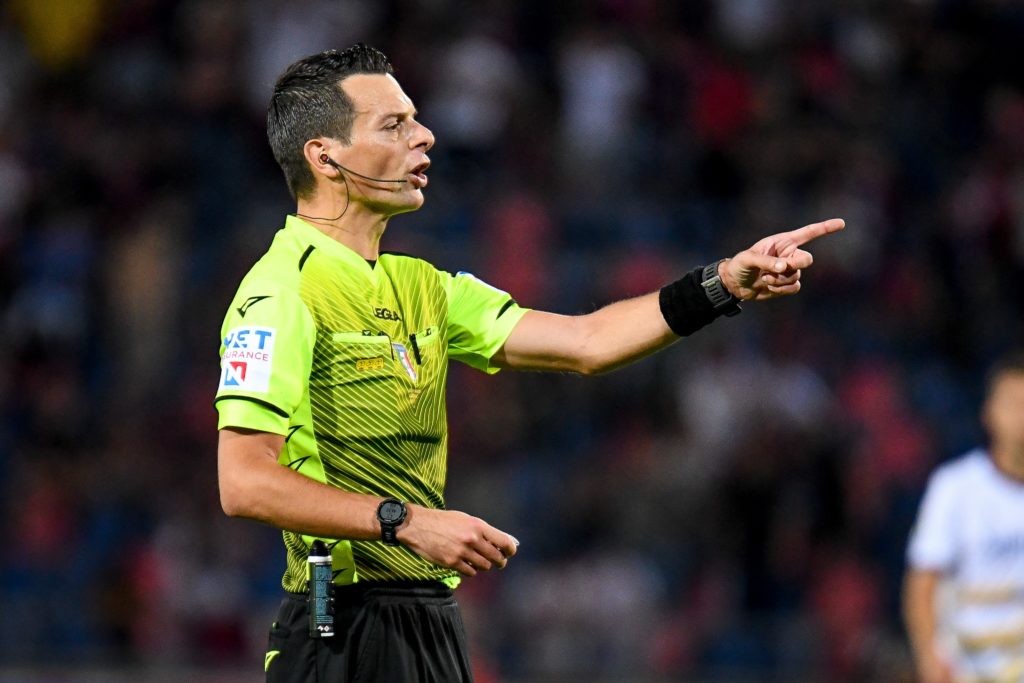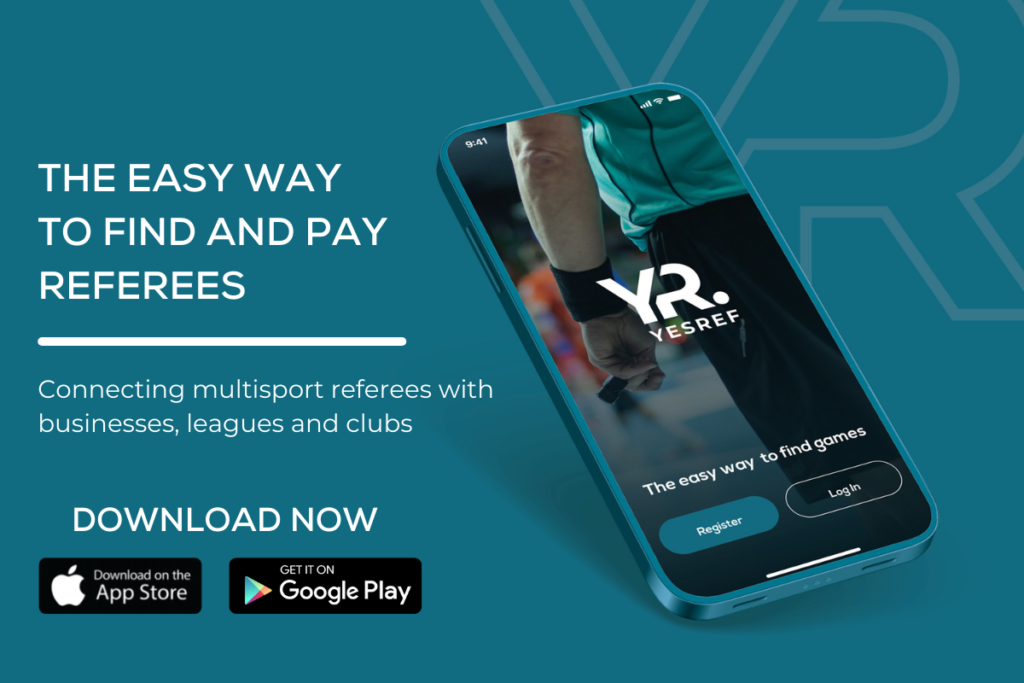You’re in the final moments before an important fixture to which you’ve been appointed. Up until now, you’ve felt good and confident about your abilities. But suddenly, something shifts. You feel a wave of self-doubt. You start questioning how well you have prepared. The urge to run out of the stadium to a place of comfort starts bubbling to the surface.
As hard as you try to overcome your inexplicable insecurity, something tells you that you’ve already made key errors. And indeed, things don’t go well. You choke up, forget what you were meaning to say to players and club officials, you long to just walk off the field, or you make silly mistakes. None of this comes as a surprise, you knew beforehand that something had gone wrong in your mind. You just don’t know why.
On the contrary, perhaps you’ve officiated a fixture where you knew you’d succeeded before you blew the first whistle. You felt confident and in control. Your mind could focus with ease, oblivious to self-doubt or distraction. Challenges to your authority melted away, and management skills you never knew you possessed came to the fore.
This phenomenon, succeeding or falling below your expected standard, is something in your mind before the game is played out in reality. This is what tennis player and coach W. Timothy Gallwey first called “the Inner Game” in his book The Inner Game of Tennis. Gallwey wrote the book in the 1970s when people viewed sport as a purely physical matter. Athletes focused on their muscles, not their mindsets. Today, we know that psychology is in fact of the utmost importance.
Gallwey recognised that physical ability was not the full picture for any participants of any sport. For referees, success is very psychological because there are really two games going on: the Inner Game and the Outer Game. If an official doesn’t pay attention to how they’re refereeing, then the Inner Game, against their insecurities, their wandering mind, their self-doubt and uncertainty, they will fail to realise their potential. The Inner Game is fought against your own self-defeating tendencies, not against the challenges to your authority.
A major factor in referees losing the Inner Game battle is trying too hard and interfering with their own natural learning capabilities. Let’s take a look at how officials can win the Inner Game challenge in our own careers by seeing the importance of not forcing things.
The Two Sides of You
When we’re learning something new, we often internally talk to ourselves. We give ourselves instructions. Psychologists have observed key insight: the idea of Self 1 and Self 2.
Self 1 is the conscious self. Self 2 is the subconscious. The two are always in dialogue.
If both selves can communicate in harmony, the game will go well. More often, this isn’t what happens. Self 1 gets judgmental and critical, trying to instruct Self 2 in what to do. The trick is to quiet Self 1 and let Self 2 follow the natural learning process we are all born competent at; this is the process that enables us to learn as small children. This capacity is within us, we just need to avoid impeding it.
Self 1 tries to instruct Self 2 using words. But Self 2 responds best to images and internalising the physical experience of carrying out the desired action.
“If we let ourselves lose touch with our ability to feel our actions, by relying too heavily on instructions, we can seriously compromise our access to our natural learning processes and our potential to perform.” – W. Timothy Gallwey, Tennis Player & Coach
Don’t Try So Hard
What’s the most common piece of advice you’re likely to receive for getting better at something? Try harder. Work harder. Put more effort in. Pay more attention to what you’re doing. Do more.
Yet what do we experience when we are performing at our best out in the middle? The exact opposite. Everything becomes effortless. We act without thinking or even giving ourselves time to think. We stop judging our actions as good or bad and observe them as they are. Colloquially, we call this being in The Zone. In psychology, it’s known as “flow” or a “peak experience.”
It has been observed that when referee coaches and managers take a step back and gave their officials less feedback, not more, they improved faster. Referees would correct obvious mistakes without any guidance. On some deeper level, they knew the correct way to officiate matches. They just needed to overcome the habits of the mind getting in the way. Whatever impeded them was not a lack of information.
There are numerous instances outside of refereeing when we can see how trying too hard can backfire. Consider a manager in the world of corporate business who feels the need to constantly micromanage their employees and direct every detail of their work, not allowing any autonomy or flexibility. As a result, the employees lose interest in ever taking initiative or directing their own work. Instead of getting the perfect work they want, the manager receives lacklustre efforts.
Or consider a parent who wants their child to do well at school, so they control their studying timetable, limit their non-academic activities, and offer enticing rewards for good grades. It may work in the short term, but in the long run, the child doesn’t learn to motivate themselves or develop an intrinsic desire to study. Once their parent is no longer breathing down their neck, they don’t know how to learn.
Positive Thinking Can Backfire
Not only are we often advised to try harder to improve our skills, we’re also encouraged to think positively. Studies have shown that when it comes to winning the Inner Game, this is the wrong approach altogether.
To quieten Self 1, we need to stop attaching judgments to our performance, either positive or negative. Thinking of, say, the award of a free kick as “good” or “bad” shuts down Self 2’s intuitive sense of what to do.
In order to let Self 2’s sense of the correct action take over, we need to learn to see our actions as they are. We must focus on what is happening, not what is right or wrong. Once we can see clearly, we can tap into our inbuilt learning process.
It’s hard to let go of judgments when we can’t or won’t trust ourselves. It was noted early on that negative assessments, telling referees what they had done wrong, didn’t seem to help them. When only making positive assessments were made, telling the officials what they were doing well. As a result of this, it became apparent that attaching any sort of judgment to how their referees officiated was detrimental.
Positive and negative evaluations are two sides of the same coin. To say something is good is to implicitly imply its inverse is bad. When Self 1 hears praise, Self 2 picks up on the underlying criticism.
“Positive and negative evaluations are relative to each other. It is impossible to judge one event as positive without seeing other events as not positive or negative. There is no way to stop just the negative side of the judgmental process.” – W. Timothy Gallwey, Tennis Player & Coach
The trick may be to get out of the binary of good or bad completely by doing more showing and asking questions like “Why did you move in that way to follow the play?” or “What are you doing differently now than you did last time?” Sometimes, getting people to articulate how they are doing by observing their own performance removes the judgments and focuses on developmental possibilities. When we have the right image in mind, we move toward it naturally. Value judgments get in the way of that process.
The Inner Game Way of Learning
We’re all constantly learning and picking up new skills. But few of us pay much attention to how we learn and whether we’re doing it in the best possible way. Often, what we think of as “learning” primarily involves beating ourselves up for our failures and mistakes, arguing with ourselves, and not using the most effective techniques. In short, we try to brute-force ourselves into adopting a capability. There is a school of thought that the standard way of learning is as such:
Step 1: Criticise or judge past behaviour.
Step 2: Tell yourself to change, instructing with word commands repeatedly.
Step 3: Try hard; make yourself do it right.
Step 4: Critical judgment about results leading to Self 1 vicious cycle.
The standard way of learning is far from being the fastest or most enjoyable. It’s slow, it makes us feel awful about ourselves, and it interferes with our natural learning process. Instead, there are other ways of following the Inner Game way of learning.
First, we must observe our existing behaviour without attaching any judgment to it. We must see what is, not what we think it should be. Once we are aware of what we are doing, we can move onto the next step: picturing the desired outcome. Psychologists advocate images over outright commands because they believe visualising actions is the best way to engage Self 2’s natural learning capabilities. The next step is to trust Self 2 and “let it happen!” Once we have the right image in mind, Self 2 can take over, provided we do not interfere by trying too hard to force our actions. The final step is to continue “non-judgmental, calm observation of the results” in order to repeat the cycle and keep learning. It takes non-judgmental observation to unlearn bad habits.
Overview
“Almost every human activity involves both the outer and inner games. There are always external obstacles between us and our external goals, whether we are seeking wealth, education, reputation, friendship, peace on earth or simply something to eat for dinner. And the inner obstacles are always there; the very mind we use in obtaining our external goals is easily distracted by its tendency to worry, regret, or generally muddle the situation, thereby causing needless difficulties within.” – W. Timothy Gallwey, Tennis Player & Coach
Whatever we’re trying to achieve, it would serve us well to pay more attention to the internal, not just the external. If we can overcome the instinct to get in our own way and be more comfortable trusting in our innate refereeing abilities, the results may well be surprising.
At The Third Team I work individually and in collaboration with different professionals where I have developed workshops associated with Resilience and Mental Toughness Development to help referees. The workshops are interactive, where referees are encouraged to open up and share their experiences to help each other.
Feel free to contact me if you’d like to know more about my workshops and how I could help you or your officials.
Best Wishes,

Nathan Sherratt
Referee Educator & Managing Director of The Third Team

Nathan Sherratt
Nathan Sherratt, Referee Educator, Resilience Trainer and Managing Director of The Third Team. A Mental Toughness Practitioner based in County Durham, North East England.


